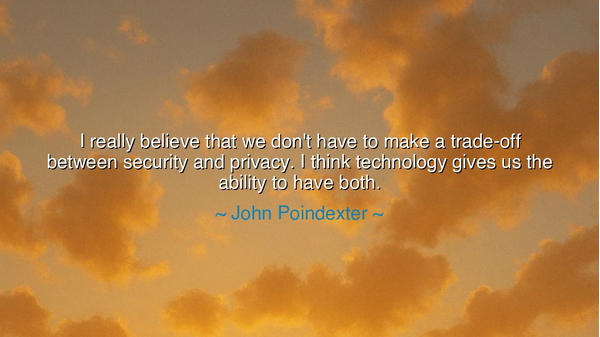
I really believe that we don't have to make a trade-off between
I really believe that we don't have to make a trade-off between security and privacy. I think technology gives us the ability to have both.






The words of John Poindexter, “I really believe that we don’t have to make a trade-off between security and privacy. I think technology gives us the ability to have both,” echo like a paradox resolved. For in the struggles of nations and peoples, men have long feared that to gain security one must sacrifice privacy, or that to preserve privacy one must live less secure. Yet Poindexter, a figure at the heart of America’s national defense debates, looked beyond this false choice. He proclaimed that technology, when wisely guided, could serve as the bridge that upholds both pillars of liberty: safety from harm and freedom of the soul.
The origin of this thought lies in the modern age, when terrorism, espionage, and digital crime stirred fear in governments and citizens alike. The question was asked again and again: Shall we surrender our private lives to be safe? Or guard our privacy and risk danger? Poindexter, once head of the Information Awareness Office, spoke not as a dreamer but as one who had wrestled with this dilemma in the halls of power. His conviction was that the tools of technology—encryption, anonymization, intelligent systems—offered a way to secure nations without enslaving individuals.
History holds examples of this struggle. In the Second World War, the British sought to preserve secrecy while also maintaining security against German bombs. At Bletchley Park, they developed encryption-breaking techniques that allowed them to read enemy messages, yet they kept the privacy of their citizens largely intact. They did not need to strip the homes of the people of their dignity; rather, they harnessed technology in a way that protected the nation and preserved liberty. Here lies the essence of Poindexter’s belief: when guided by wisdom, technology can be a shield that guards both body and spirit.
Yet his words are also a challenge. For it is easier to demand sacrifices than to labor for balance. A ruler may declare: For safety, we must watch all things. Or a rebel may insist: For privacy, let all walls of defense fall. Both extremes ignore the truth that with discipline and innovation, both can coexist. The harder path is to design systems of trust, where technology serves the people and not the other way around. This is the path Poindexter calls us to walk.
The deeper meaning is that freedom and safety are not enemies; they are brothers who must be reconciled. Without security, privacy is fragile, for the violent can shatter it at will. Without privacy, security is hollow, for life becomes the cold safety of a prison. Only when the two are woven together—through wise laws, ethical leadership, and responsible use of technology—can a society be both safe and free.
For those who live now, the lesson is urgent. Embrace the tools of your age—encryption to guard your voice, firewalls to protect your data, and transparent laws to restrain those who wield power. Demand of your leaders that they pursue both privacy and security, not one at the expense of the other. In your personal life, do not abandon vigilance, but neither surrender your dignity. Technology is a tool, but only the wisdom of the people ensures it is used rightly.
So let this teaching endure: the choice between security and privacy is a false one. Seek balance, demand integrity, and use technology as the servant of both. For if guided by wisdom, the tools of the age may grant us what once seemed impossible—to live in a world both protected and free, both safe and dignified. This is the legacy of Poindexter’s words, a vision not yet fulfilled but forever worth striving toward.






AAdministratorAdministrator
Welcome, honored guests. Please leave a comment, we will respond soon